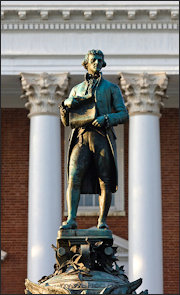
What would T.J. say?
The University of Virginia could reach a milestone this year: collecting more money from private donations than from the state.
At a Board of Visitors meeting earlier this month, Melody Bianchetto, UVa’s vice president for finance, told board members that a steady stream of philanthropic income is expected to provide more than $150 million in operating funds over the next years, reports Derek Quizon with the Daily Progress. That compares to the $150.5 million appropriated from the state General Fund to the University of Virginia this year.
Quizon asks an interesting question: If the trend of increasing reliance upon private over public support continues, what are the implications for how UVa is governed? Will the General Assembly lose leverage?
“You’re more responsive to the goals of the people who give you your revenue,” says Dustin Weeden, who analyzes higher-ed issues for the National Conference for State Legislators. “There are a whole host of concerns private donors have that are different from the goals of the state.”
Private donors tend to favor things like new facilities and research, which could benefit the state in other ways, but not necessarily in the way public universities traditionally benefit the state: with affordable undergraduate degrees for in-state students. “Public institutions can’t completely shrug it off,” Weeden said. “But I think they push for more autonomy and control over their own operations.”
Weatherford said UVa and William & Mary are experimenting with a new model — new for public universities in Virginia at any rate — that may allow them to keep costs low in the long run. They have the freedom to try this experiment because the state allows it, says Greg Weatherford, spokesman for the State Council of Higher Education for Virginia. “One of the best things about being in Virginia is they have the flexibility to try that,” he said.
Quizon also quotes me in the article, addressing the question of whether UVa might aim to become a private institution. Even if the shift to private philanthropy continues, I opined, I didn’t see the university seeking to transform itself into a private institution. “That impulse does exist — people would probably love to get rid of that General Assembly oversight and cut the strings — but at the end of the day, they want to be a state institution.”
Bacon’s bottom line: No question, passing the 50/50 milestone of philanthropic versus public funding has symbolic value, reminding everyone of the state’s diminished role in supporting the university. But that $150 million is still critical to the institution’s functioning. It could not be replaced by philanthropy in the short run, and it could not be easily replaced by raising tuition. The balance of power in the relationship between the university and the state doesn’t change. Unless UVa uses more of those philanthropic dollars to stabilize tuition, as opposed to building a grander, more prestigious institution of higher learning, they will rely upon state funding and legislators will continue to agitate against tuition hikes.


